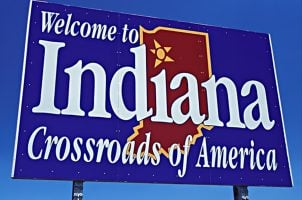Penn State University Studying Whether Online Gambling is Detrimental to Society
Posted on: October 21, 2020, 09:24h.
Last updated on: October 21, 2020, 10:44h.
Researchers at Penn State University are studying the societal impacts of legal online gambling in Pennsylvania.

Dr. Glenn Sterner, assistant professor of criminal justice at Penn State Abington, is heading up the study. Sterner is also the coordinator of the Greater Philadelphia Office of the Criminal Justice Research Center.
Penn State Abington received a grant through the Pennsylvania Department of Drug and Alcohol Programs to assess the impacts of interactive gaming.
Since Pennsylvania has very recently legalized online gaming, we are in a very unique position to attempt to measure and monitor the impacts,” said Mikael Ahlgren, one of Stern’s assistants. “We are in the early stages, and there is much to be learned.”
Pennsylvania legalized online gambling through its vast gambling expansion package passed in October of 2017 and signed by Gov. Tom Wolf (D). Today, people inside the Keystone State can play internet slot machines and table games, instant lottery games, and bet on sports.
Online Gambling Skyrockets During COVID
Pennsylvania ranks No. 3 of the 25 states that have commercial gambling. The Commonwealth’s gaming industry won more than $3.38 billion from players in 2019. That trails only Nevada ($12B) and New Jersey ($3.4B).
COVID-19 has disrupted gaming across the country, shutting down every commercial casino property at some point this year. Pennsylvania is only one of only four states that have online casinos. The state has greatly benefited from its internet gaming options. New Jersey, Delaware, and West Virginia have also legalized online casinos.
Pennsylvania’s brick-and-mortar casinos were shuttered on Wolf’s orders in mid-March. They began reopening in June.
Online gambling flourished during the closures. And iGaming has continued to post revenue surges in the months following, as the land-based casinos operate in reduced capacity and under numerous health safety measures, including the mandatory wearing of face masks.
iGaming Gross Gaming Revenue
- February: $19.4M
- March: $24.3M
- April: $43M
- May: $55.8M
- June: $50M
- July: $54.3M
- August: $56M
- September: $54.5M
Internet slot machine revenue is taxed at 54 percent. Online table games are subjected to a 16 percent tax.
Pennsylvania’s iGaming revenue in June through September shows that internet slots and tables continue to see a substantial increase in play compared with pre-coronavirus. In a note regarding the US gaming industry outlook in the wake of COVID-19, Fitch Ratings said recently that some of the former land-based gamblers may have “permanently migrated to online.”
Survey Focuses on Problem Gambling
The goal of the Penn State University research regarding iGaming, Sterner explains, is to determine if online casinos are detrimental to the public.
“When it comes to understanding the effects of gambling in general, it’s not an area that’s widely researched,” said Sterner.
“This is the first time Pennsylvania has had a probability study focused solely on problem gambling,” said Rachel Kostelac, a communications director with the Pennsylvania Department of Human Services. “This report could show the need for changes to the prevention or treatment systems already in place, expansions of treatment and prevention, and potentially even a need for more funding related to prevention or treatment.”
Currently, $2 million annually, or 0.2 percent of casino gaming revenue, whichever is greater, is allocated towards responsible gaming programs in the state. Sterner says telephone surveys will be conducted to gauge people’s experiences with interactive gaming.
Related News Articles
GVC to Fund Harvard Medical School Problem Gambling Research
Indiana Report Says iGaming Won’t Harm Brick-and-Mortar Casinos
Most Popular
Mirage Las Vegas Demolition to Start Next Week, Atrium a Goner
Where All the Mirage Relics Will Go
Most Commented
-
Bally’s Facing Five Months of Daily Demolition for Chicago Casino
— June 18, 2024 — 12 Comments -
Chicago Pension Mess Highlights Need for Bally’s Casino
— July 2, 2024 — 5 Comments
















No comments yet